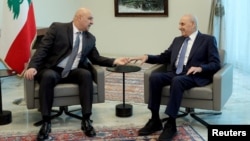Lebanon has a new president and prime minister that many Lebanese and Gulf and Arab countries hope will bring the war-scarred Mediterranean nation out of its economic and political crisis.
Lebanon’s new President Joseph Aoun vows to tackle corruption and wants only the national army to hold weapons and protect Lebanon’s borders, moves likely to challenge the Shiite militia Hezbollah and Israel.
Many Lebanese see both Aoun and Prime Minister Nawaf Salam as being above the political infighting that has paralyzed Lebanon in recent times.
Aoun headed Lebanon’s national army for years, winning the respect of citizens and foreign leaders, while Salam is a leading international judge who won parliament’s support.
But as analyst Dania Koleilat Khatib, president of the Research Center for Cooperation and Peace Building in Beirut, told VOA, they face a mammoth task ahead fixing the country’s broken financial system and seeing the Hezbollah militia ultimately disarmed.
“Joseph Aoun has a lot of challenges. He raised the bar very high,” Khatib said. “Returning the money of the depositors, removing the arms. But for him to deliver on his promises, he needs support. Unless Saudi [Arabia] and the UAE (United Arab Emirates) really keep the pressure on the Lebanese political structure, on the deputies, the political parties, he won’t be able to deliver.”
Hezbollah’s political wing and other Shiite lawmakers have been accused of stymying necessary economic reforms and justice on issues, such as the disastrous 2020 Beirut port blast. Senior Hezbollah lawmaker Mohammed Raad accused Aoun of trying to exclude the group from power in Lebanon by not allowing their choice of caretaker Prime Minister Najib Mikati stay in the post.
“Hezbollah is weakened, but they still are there,” Khatib said. “They still have a political bloc. So, they (Saudi Arabia and the UAE) have to pressure everyone on the political scene to make sure he (Aoun) can do reforms. Reforming means exposing all these guys because they are all involved in the corruption. Will they accept that? It’s a very much uphill battle.”
Needed reforms include rooting out corruption from Lebanon’s state institutions, restructuring its public debt and overhauling the banking system to unlock financial aid from the International Monetary Fund and Gulf Arabs. Rebuilding south Lebanon and parts of Beirut are priorities following the Israel-Hezbollah fighting that stopped with a fragile truce in November. Israel has warned the ceasefire could collapse later this month if Hezbollah does not withdraw beyond the Litani River in the south.
Nicholas Heras of the Washington-based New Lines Institute said Hezbollah still has weapons that could be viewed by some Lebanese as useful for protecting their territory from Israeli aggression. But he said Hezbollah has to be disarmed and integrated into the national military, or Israeli attacks will continue.
“President Aoun’s entire portfolio is how do you secure Lebanon’s borders and how do you return the sovereignty of the Lebanese state over all of its territory, which has the implied task to put Hezbollah on a process of disarmament,” Heras said. “The Israeli interpretation of their ability to maneuver in Lebanon assumes that there will be an unsuccessful attempt by the Lebanese armed forces to subordinate Hezbollah or contain it.”
Heras said Prime Minister Salam will be tasked with moving “Lebanon on a path to recovery with getting its geopolitics squared away.”
“The prime minister is going to be judged on how effectively he can navigate the geopolitical currents,” Heras said, “which is still uncertain in terms of the seeming rise of Turkish influence, how Iran reassesses its approach, how Saudi Arabia and United Arab Emirates decide to respond to the fall of the Assad government in Syria.”
According to Lebanon’s sectarian power-sharing system, the president is a Maronite Christian, and the prime minister must be a Sunni Muslim. The president selects him in consultation with the Shiite parliament speaker based on support by the lawmakers.




